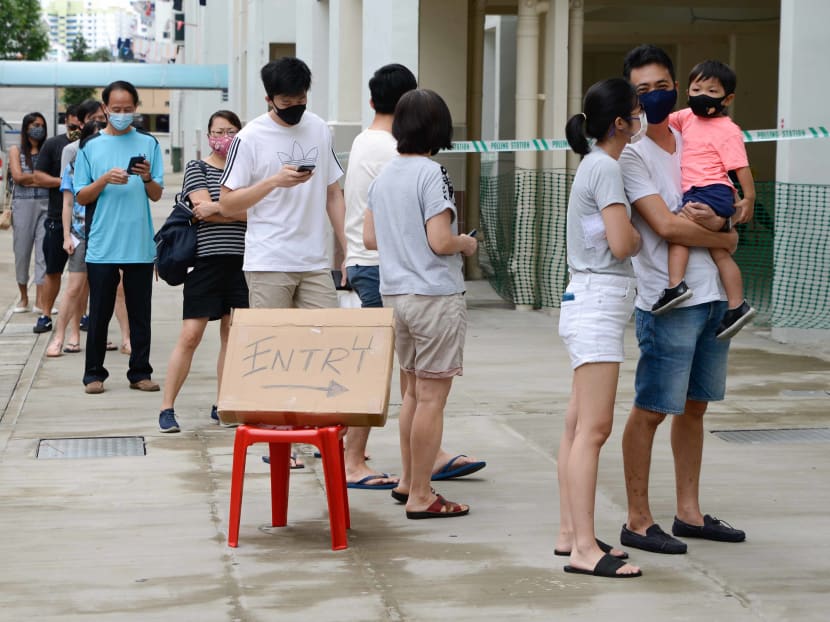PAP has to better understand millennials to win back votes, says Ambassador-at-Large Chan Heng Chee
SINGAPORE — Singapore was at its “youth peak” in the recently concluded General Election (GE), with those aged between 25 and 35 forming the biggest bulge in its population pyramid in 2020, Ambassador-at-Large Chan Heng Chee said.

Queues form outside a polling station at 217 Petir Road in Bukit Panjang on July 10 2020. Prime Minister Lee Hsien Loong said that the General Election reflected a desire by younger voters for a greater opposition presence in Parliament.
SINGAPORE — Singapore was at its “youth peak” in the recently concluded General Election (GE), with those aged between 25 and 35 forming the biggest bulge in its population pyramid in 2020, Ambassador-at-Large Chan Heng Chee said.
And the ruling People’s Action Party (PAP) will have to understand this group better to “win back their vote”, she added. Professor Chan was delivering an online lecture titled, Singapore in a Time of Flux: Optimism from the Jaws of Gloom, on Wednesday (July 15).
This was the last of her lecture series as an SR Nathan fellow with the Institute of Policy Studies (IPS), a think-tank from the Lee Kuan Yew School of Public Policy at the National University of Singapore (NUS).
Prof Chan started her lecture with an analysis of the GE2020 results, which saw PAP lose another Group Representation Constituency (GRC) and taking 61.24 per cent of the popular vote — a drop from the 69.9 per cent it achieved in GE2015 and is its second lowest overall vote share since the country's independence.
Prof Chan said that the younger generation, which she termed the “Zoomer generation”, prefers “personal narratives and ‘I feel your pain’ connectivity, approachability and authenticity”.
She said: “The Workers' Party understood this and chose youthful candidates and issues for the Zoomer generation... This online digital politics is now the new retail politics — up close and personal.”
The GE saw WP achieve its best ever electoral showing, winning 10 seats including four in the newly formed Sengkang GRC.
‘MILLENNIALS WILL CONTINUE TO SUPPORT DIVERSE VOICES’
During a press conference held after the final election results were out, Prime Minister Lee Hsien Loong said that the outcome reflected a desire by younger voters for a greater opposition presence in Parliament.
In her lecture, Prof Chan reiterated: “Clearly, this age group bought the opposition message of the need for diverse voices in Parliament and the need for checks and balances.”
She added that while it has been “conventional wisdom” that people become more conservative as they grow older, the millennials in Singapore will buck this trend as youth elsewhere have already demonstrated a “distinct and increasingly liberal outlook”.
She cited from a Pew Research report that suggested that American millennials and Generation X-ers are different from the Boomers and the Silent Generation, who are 56 years old and above.
“I expect our millennials will continue to support diverse voices and an opposition in Parliament as a good thing even as they age,” Prof Chan predicted.
“They will have specific personal concerns, too, in different phases of their lives. The incumbent party will have to understand this group better to win back their vote.”
NEW POLITICAL CULTURE EMERGING
Prof Chan also said it was evident that a new political culture is emerging.
“On the one hand is the culture of government that emphasises strong government, effectiveness, a legalistic culture, delivery of public goods and services, and a better life for the people. Critics have characterised the PAP political style as paternalistic,” she said.
“On the other hand, many Singaporeans invoke democracy and want to see Singapore evolve into a full-fledged democracy.”
She noted that political commentators have asked “why the PAP is asking for a strong mandate, and why it is not more magnanimous in the treatment of opponents”.
“(These commentators) would like to see rules applied to all political participants fairly, that gerrymandering be restrained,” she said.
While Singaporeans yearn for democratic competition or competitive politics, they appear to be “repulsed” by the competitive, mean politics of some Western democracies, she noted, adding that educated and younger Singaporeans in particular “do not want to see political overkill”.
WHAT COULD HAVE AFFECTED VOTE SHARE
During the lecture, Prof Chan gave her take on the issues that affected PAP’s vote share.
These spanned the party's performance as the Government in the last five years, the Government’s handling of the Covid-19 pandemic in the past five months, as well as the nine days of campaigning for GE2020.
She said that voters did not approve of the way the elected presidency was introduced and other policies such as the Protection from Online Falsehoods and Manipulation Act.
On the handling of Covid-19, she noted that it was done with a micromanaging of rules and protocols for businesses and a lack of clarity, as fears and anxieties about jobs grew.
And when it came to the hustings, “it was about messaging, communicating and the online presence and savviness of the parties”.
During a question-and-answer segment of the lecture, Prof Chan, who was in the nine-member Constitutional Commission to review the elected presidency system in 2016, was asked if she would approach the review differently with hindsight.
Following the review, constitutional amendments were passed to reserve the elected presidency for candidates of a particular racial group if there had not been a president from that group for the five most recent presidential terms.
Prof Chan stated in her reply that she supports any mechanism that allows for better representation of the country’s different ethnic groups.
Noting that the presidency is a “symbol of the country”, she added: “It must unify the country, and it must represent what the country looks like in terms of its demography in the city.”
MAKING ROOM FOR ALTERNATIVE VIEWS
Following the elections and in a post-Covid world, Prof Chan questioned if Singapore’s governance model is adequate.
She said that Singapore “must make room for alternative views” as it looks to the future with an ambition of harnessing the new economy and finding unconventional opportunities.
“To harvest the opportunities out there, to think the unthinkable, we must expand intellectual space — giving more room for expression to encourage Singaporeans, especially young Singaporeans, to be bold, to think differently, think innovatively.”
Adding that the country should “seriously discourage groupthink”, she said: “In a successful bureaucracy, it is even more necessary to allow out-of-the-box thinking within. If our political model needs fixing, it is how to accommodate differences and diverse views in our institutions and our country.”
The civil service also needs to evolve, she said, adding that civil servants “should think very hard and make sure that we don’t allow groupthink to infect us”.
Policies should be implemented with a “human touch”, with Prof Chan calling it a “very cold implementation of policy” when people go by the playbook or standard operating procedures, or are overly concerned about practising some discretion.
“It goes to the ground. We should do it intelligently with a feel of the ground,” she said.
Asked how the young may be educated differently to thrive in a more complex political environment, she said that the challenge lies in breaking up silos built by technology and the digital world.
“We are all just going into the websites or the chat groups of, maybe, our own kind, our own values, our own politics, so we are quite siloed,” she added.
In order to break up these silos, a “whole bunch of actions, not just one action” have to happen in schools and the social space, such as consciously ensuring diversity when hiring employees or sending out invites to a party, Prof Chan said.
Join our Telegram channel to get TODAY's headline news: t.me/todayonlinesg









